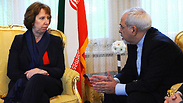
Iran has so far gained without having to give anything significant in return, Prime Minister Benjamin Netanyahu said Sunday.
Iran and world powers embark Tuesday on the Herculean task of transforming an interim nuclear deal into a long-term accord satisfying all sides and silencing talk of war for good.
"It has received a major easing of sanctions and the Iranian economy is already responding appropriately," Prime Minister Netanyahu said.
Meanwhile, Netanyahu said, Iran is continuing with advanced research and development of centrifuges.
"Iran is not prepared to concede even one centrifuge," the prime minister asserted, adding that "Iran does not need any centrifuges for nuclear power for civilian purposes."
Related stories:
- Report: Iran, powers nuclear talks hit snag on centrifuge research
- Iran's Khamenei says nuclear talks show US enmity
- Iran, UN agency agree on next steps of nuclear probe
He noted that Israel's policy "is clear and is active on two tracks: First, to expose Iran's unchanging aggressive policy. Second, to demand the dismantling of Iran's enrichment capacity."
The prime minister also decried the continuation of Tehran's aggressive policies both inside and outside of the country.
"Inside Iran, it is executing innocent people. Outside Iran, it supports the continued killings by the Syrian regime, which would be unable to act without it, without its support," the premier elaborated.
"Iran is also continuing to arm terrorist organizations with advanced, deadly weapons and, of course, it is continuing to call for the destruction of the State of Israel," he continued.
After a decade of failure and rising tensions, US President Barack Obama has put the chances of reaching a final status agreement at not more than "50-50", while Iranian Foreign Minister Mohammad Javad Zarif has predicted "difficult" discussions.
The scheduled three-day meeting in Vienna between senior diplomats from Iran and the United States, China, Russia, Britain, France and Germany - the P5+1 - is the first in what is expected to be a series of tricky encounters in the coming months.
It comes after foreign ministers struck a deal in Geneva on November 24 that saw Iran agree to curb - for six months - some of its nuclear activities in exchange for minor relief from painful sanctions.
That agreement, which came into force on January 20, extends the theoretical "break-out time" needed by Iran - which denies seeking the bomb - to produce enough highly-enriched uranium for a nuclear weapon.
In return Iran is due to get over the six months some US $6-7 billion in sanctions relief, including US $4.2 billion in assets frozen in overseas bank accounts.
But Iran's nuclear freeze is only temporary - although it can be extended - and the bulk of UN and Western sanctions remain, continuing to deprive Iran of billions of dollars in oil revenues every week.
Under the "comprehensive" deal now being sought, which the parties aim to conclude and commence implementing by November, the powers will want Iran to scale back its activities permanently.
In exchange, Iran would see all UN Security Council, US and EU sanctions lifted.
The deal might include the closure of Iran's Fordow facility, slashing the number of centrifuges enriching uranium, cutting its stockpile of fissile material and altering a new reactor being built at Arak, diplomats say.
This, plus tighter UN inspections, would not remove entirely Iran's capability to get the bomb but would make it substantially more difficult. According to Obama, it would be "impossible".
"Your enrichment capacities are incompatible with your civilian nuclear program, we are saying to them ... They don't fit with your statement that you have no military objectives," one Western envoy involved in the Vienna talks said.
Hard sell
But how such a deal goes down with hardliners in the United States and in Israel, as well as with Sunni Arab monarchies in the Gulf, remains to be seen."I think both sides would be willing to make compromises to meet the bottom lines of the other side," Richard Dalton, the former British ambassador to Tehran now at think-tank Chatham House, told AFP.
"The trouble is that both sides have hard men outside the negotiating room who have to be satisfied."
Iranian President Hassan Rouhani, a relative moderate whose election last year has helped thaw relations with the West, for now retains the backing of supreme leader Ayatollah Ali Khamenei.
Rouhani called last week for the talks to be "fair and constructive", while Tehran has laid out a series of "red lines" including refusing to close down any nuclear facilities or to stop medium-level enrichment.
"I am not fully sure whether Khamenei himself is fully committed to this process yet," Siavush Randjbar-Daemi, Iran and Middle East lecturer at Manchester University, told AFP.
"Geneva really was a stop gap, a band-aid solution that didn't really heal the wounds."















